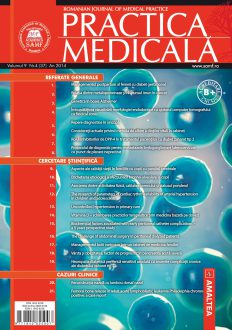SELECT ISSUE

Indexed

| |

|
|
|
| |
|
|
|

|
|
|
|
|
|
|
HIGHLIGHTS
National Awards “Science and Research”
NEW! RJMP has announced the annually National Award for "Science and Research" for the best scientific articles published throughout the year in the official journal.
Read the Recommendations for the Conduct, Reporting, Editing, and Publication of Scholarly work in Medical Journals.
The published medical research literature is a global public good. Medical journal editors have a social responsibility to promote global health by publishing, whenever possible, research that furthers health worldwide.
Biochemical factors associated with early peritoneal catheter complications – a 5 years prospective study
Dan MITOIU, Cristiana DAVID, Ileana PERIDE, Ileana VACAROIU, Andrei NICULAE, Alexandru CIOCALTEU, Ionel Alexandru CHECHERITA and Niculae IORDACHE
ABSTRACT
Introduction. Early complications of peritoneal dialysis (PD) catheter restrict the applicability of the method. Highlighting and removing the predisposing factors contribute to a better survival of this renal replacement therapy.
Aims. To establish a correlations between serum albumin, urea and creatinine values before surgery and the risk of early complications after catheter insertion.
Methods. We conducted a prospective study between March 2009 and March 2014 including all patients that underwent laparoscopic insertion of Tenckhoff catheter in our hospital. Several biochemical characteristics of interest were assessed before surgery (serum albumin, BUN, creatinine) and we correlated their values in the groups of patients presenting or not early complications of PD catheter.
Results. In the total of 77 patients (mean age 60.08 +/- 11.64 years), 54.54% men, we noted 23 early complications (29.76%), of which 13 infectious complications (56.52%) and 10 mechanical complications – catheter malposition (n = 4), fluid leakage (n = 3), abdominal wall hematoma (n = 3). Low levels of serum albumin have shown positive association both with infectious and mechanical complications (p = 0.02112, respectively p = 0.01277). High values of urea and creatinine are strongly correlated to mechanical complications (p = 0.18295 and 0.18770), but not to the early infectious complications (p = 0.5754, p = 0.86001).
Conclusions. Forcing the early use of Tenckhoff catheter due to high and dangerous levels of serum urea and creatinine proved to result in increased episodes of mechanical complications; hypo-albuminemia in pre-dialysis patients correlates positively both with mechanical and infectious catheter complications in the first month after insertion.
Keywords: peritoneal catheter, early complications, biochemical predictors
